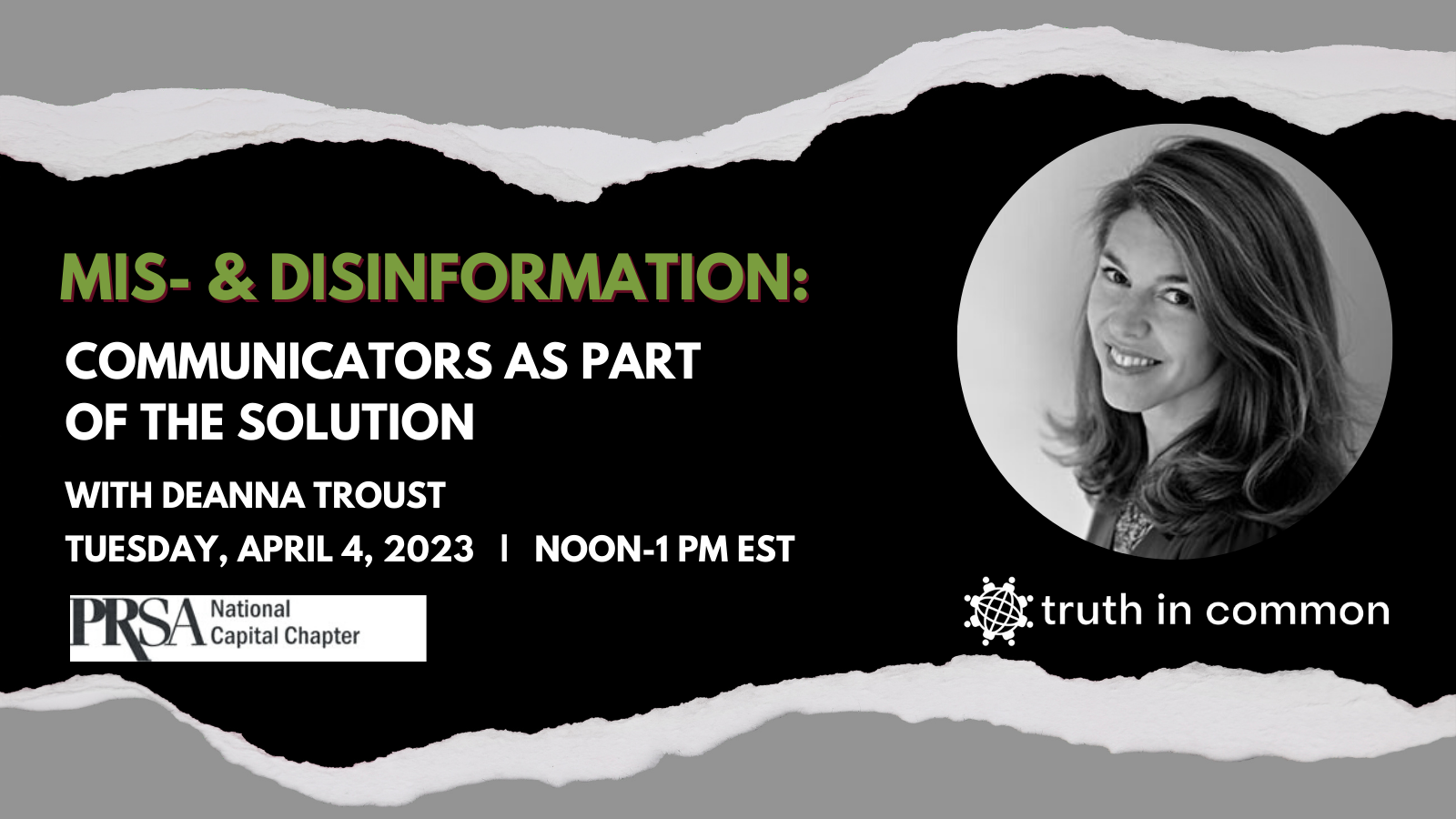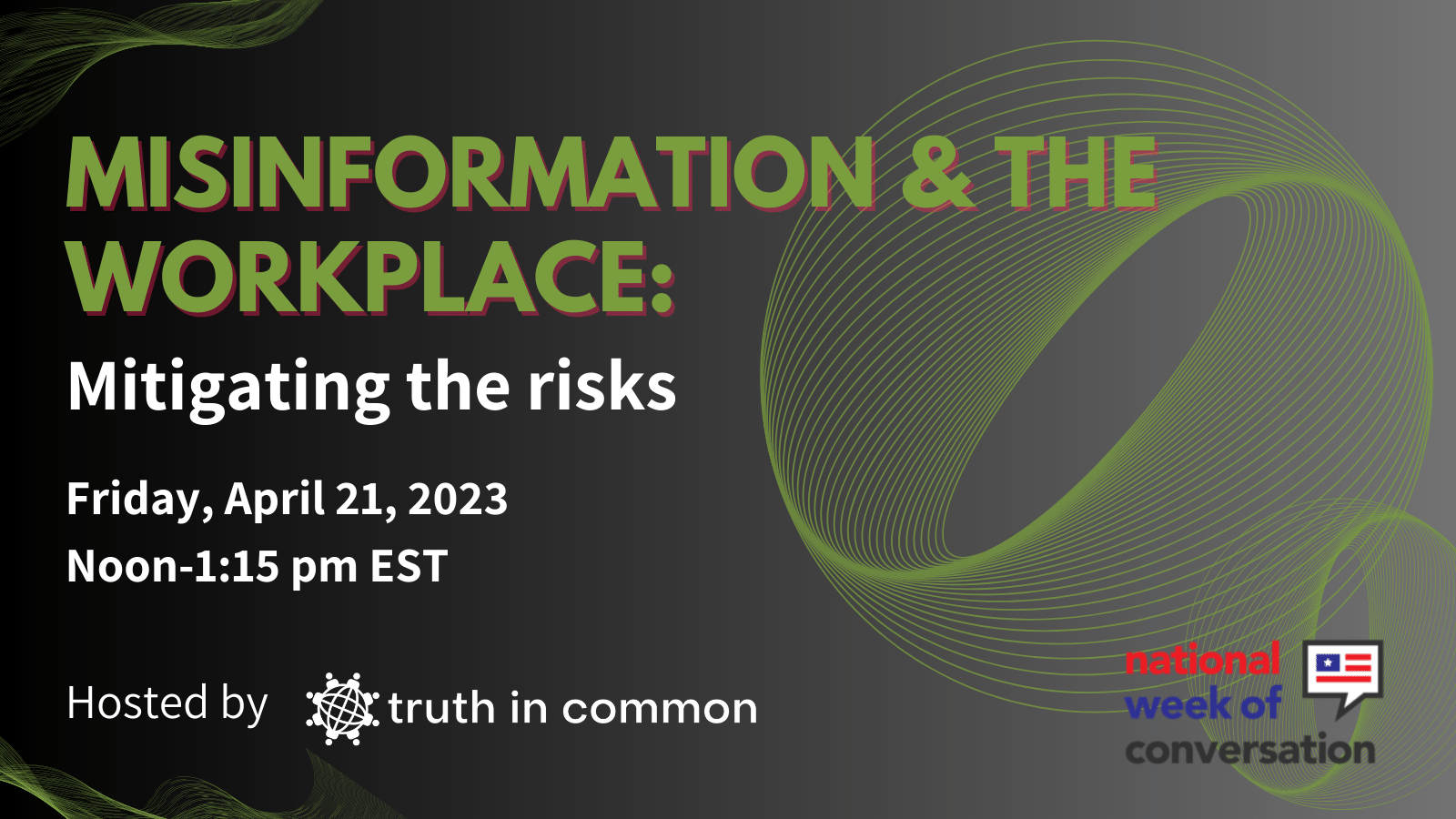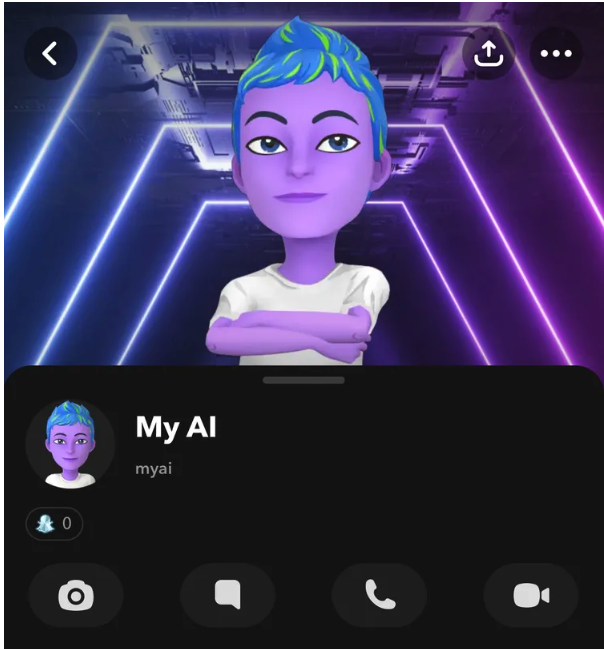March roundup: Chatbots and our dystopian future
Humane Tech warns of AI's risks to humanity; platforms embed fast-growing ChatGPT; TikTok struggles with data privacy concerns; upcoming Truth in Common events

When OpenAI released ChatGPT4 on March 13, it was a powerful upgrade for those in the field – a more reliable version of the chatbot that showed significantly greater accuracy on tests. In one case, it was able to build a classic video game in 20 minutes when prompted by a user with no knowledge of JavaScript, as reported in Forbes.
For the rest of us, the versions were less meaningful than the ChatGPT release overall, which for some was a total surprise: What's this? It can write my bio better than I can? What's a large language model, anyway?
I've included a resource that answers that question at the end. For now, please note the gap between tech creators and average tech users the above scenario highlights and consider its significance given the speed with which these technologies are embedded – and can go south. In one example, hackers already are using ChatGPT to speed up their attacks.
A cautionary tale
This gap is also what prompted Center for Humane Technology founders Tristan Harris and Ava Raskin to do a TED talk called The AI Dilemma. It's captured in the Your Undivided Attention episode embedded below and sheds light on what AI applications like ChatGPT mean for the future of social media, business and our communities. The hosts hit us with this finding as well: Half of AI researchers believe there's a 10% or greater chance that humans will go extinct due to their inability to control AI.

Apologies if I've ruined your day, and let's be clear: Some call this perspective overblown, including ousted Google researcher and founder of Distributed AI Research Institute Temnit Gebru. Others are stoking an active movement to perpetuate it; still others find the whole thing exhausting. Humane Tech, for their part, based their assertions on conversations with dozens of experts in AI safety (and is supported by major funders who vet their projects carefully). Harris also appeared in The Social Dilemma, the podcast's precursor of sorts, for what that's worth.
The important thing is these technologies are evolving at lightning speed and we just don't know where they're headed, for sure. I trust Humane Tech to give it to us straight; if we follow experts like these while remaining curious about AI's potential, that's a good, balanced mindset, in my view, to carry into an AI-rich future.
If you don't have time for the episode now, you can launch it, bookmark and listen later.
Upcoming Truth in Common events
Please join us!


MIS- & DISINFORMATION: Communicators as Part of the Solution
Sponsored by PRSA-NCC
$35 for non-members, $20 for members
MISINFORMATION & THE WORKPLACE: Mitigating the risks
Dave Fleet, Global Digital Crisis, Edelman
Jillian Youngblood, Executive Director, Civic Genius
Moderator: Deanna Troust, Truth in Common
a free, featured event as part of National Week of Conversation 2023
AI is everywhere: What parents need to know
SpeechKids Podcast by Gabriele Nicolet
free/no sign-up necessary
The platforms keeping us on our toes
Whether they're doing our taxes, offering new "friends" to chat with, at the brink of cancellation or turning to old-school loyalty schemes – the platforms never cease to fascinate. Here's the latest from several, along with some thoughts for brands and families who may be using these platforms.
ChatGPT is the fastest-growing (platform? tool?) ever
It's not social media, but it's everywhere. ChatGPT gained 100 million monthly active users in its first two months – something TikTok took nine months to do and Instagram, two and a half years. Its potential to spew misinformation notwithstanding, here's a piece on the ways people use ChatGPT, from Time.
For organizations, families and everyone: I highly recommend you try it.
Snapchat introduces MyAI
Snapchat released its MyAI feature on February 23. It uses an embedded form of ChatGPT to power an avatar users can converse with at any time. “The big idea is that in addition to talking to our friends and family every day, we’re going to talk to AI every day,” Snap CEO Evan Spiegel shared with Verge in this helpful piece.

The creepiness of that statement aside, this feature, currently available only to Snapchat Plus users, is a concerning use of ChatGPT according to Harris and Raskin, who found it can send users down dangerous paths that are, of course, unmonitored by design. When they pretended to be an underage user and described a trafficking scenario, the chatbot offered words of encouragement, not caution, even encouraging the imposters to use contraception.
For organizations: If Snapchat is part of your marketing strategy or ad buy, you may want to rethink that – on principle, and as a statement that your organization supports responsible uses of AI. Already MyAI is being positioned as a great new way to engage and serve customers. Given the potential pitfalls I'd suggest you also decline that particular use outright, at least for now.
For families: If you don't want your kid exposed to potential dangerous scenarios like the one above, for now you can simply say no if they ask to add Snapchat Plus, which offers sneak previews of new features for $3.99 a month. (I'm not on the app myself so I can't see how much they're advertising these features.) The plan is to offer it to all users eventually, though, and that could be time for an unpopular conversation. You can find MyAI in the Chat tab, pinned above chats with friends.
TikTok dances around criticism from the Hill
You've seen TikTok in the news, from CEO Shou Zi Chew's Congressional testimony that rather than appeasing lawmakers, moved proposals to ban or force the sale of the app to a U.S. firm forward, to the Biden administration's banning TikTok on government phones – a move well over 30 states and at least 20 public universities have replicated.
Why? At the heart of the discomfort is that TikTok is beholden by law to share information at the Chinese government's request, potentially putting some 150 million U.S. users' data at risk. Concerns that TikTok may be gearing up for U.S. election interference haven't helped.
It's a good time to recall how TikTok is different from other social media platforms. With short videos and quick swiping, TikTok delivers more content, more rapidly, and thus gathers more user data than its peers. The algorithm also draws from the universe of content on the app serving you videos, not just what friends share or advertisers pay for. Combine that with the emotional appeal of music and dancing and you get the most engaging and "sticky" user experience on the market.
ICYMI, this 2021 Wall Street Journal investigation found that even a momentary hesitation as you scroll through videos is all the platform needs to serve you content that's uncannily aligned with your interests – it's that smart, and has that much other data at its disposal. More importantly, it can understand your vulnerabilities much faster than other platforms, says Algotransparency founder Guillaume Chaslot, who helped build the YouTube algorithm and is quoted in the WSJ piece. "Faster" means within hours or even minutes of your first use. The investigation is in video format and accessible without a subscription; check it out.
For organizations: This is also a good time for brands to review their alignment with the app. More than one of my clients have had great success building a strong following, quickly, on TikTok so I get the business value. Communicators should examine, though, their comfort level in leveraging an app that cloned itself to serve Russia's propaganda needs while blocking outside content that could offer Russians alternative information. I remember feeling very uncomfortable when Russian outlet RT asked to attend a media event I was supporting in DC a few years ago; is using TikTok for marketing really any different?
For families: If one or more of your kids already are on the app it may seem impossible to divest from it as a family. The government may do the job for us, but it will take awhile and given that we've been unable to regulate any other social media platform, still seems like a long shot to me. Perhaps you can give give kids a heads-up about the policy and addictive concerns, while making a pact to watch TikTok content together now and then? That way you can monitor what's showing up there while preparing them that TikTok's days may be numbered in the U.S.
Twitter white lists VIPs and hate speech
Contrary to the perspective that no VIPs are left at Twitter, or perhaps because of it, Elon Musk's team has created a white list of users whose content is boosted. The list, which "spans the political gamut" according to Platformer reporters who obtained documents about it, includes NBA All-star LeBron James, Daily Wire founder Dan Shapiro, President Biden, journalists Matt Yglesias and Glenn Greenwald and Representative Alexandria Ocasio-Cortez, D-NY. The secret list of Twitter VIPs getting boosted over everyone else is paywalled but you can see the first few paragraphs, which may be all you have time for anyway.
Meanwhile, the Institute for Strategic Dialogue and CASM Technology used machine learning to help assess and document the rise of antisemitic Twitter content after Elon Musk bought the platform. as reported by Cristiano Lima in Washington Post's Tech202 newsletter. This is why we need independent researchers who study social media.
For organizations: It's harder than ever for your tweets to be seen. Frequent analytics checks can help you see if engagement is flagging.
More resources
What are large language models? Here you go, in case you haven't had enough.
- The emerging types of language models and why they matter, Kyle Wiggers, TechCrunch, April 28, 2022
- On the dangers of stochastic parrots: Can language models be too big? Gebru et al, March 2021
As always, feel free to share as you like and your feedback is welcome.
Deanna Troust
dtroust@3storiescomm.com
Twitter: @DeeLT
LinkedIn
To be removed from this list, please email me and I'll take you off. No worries.


